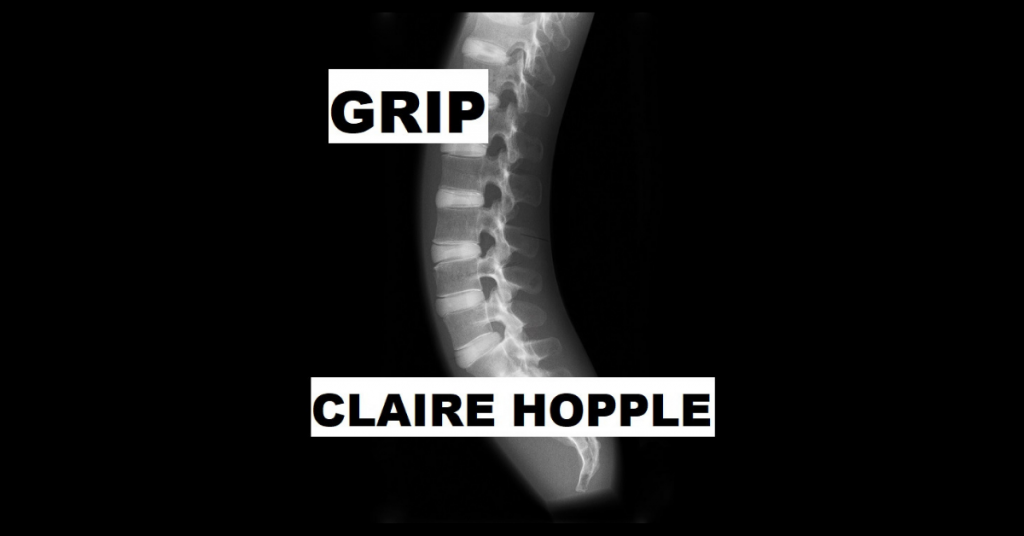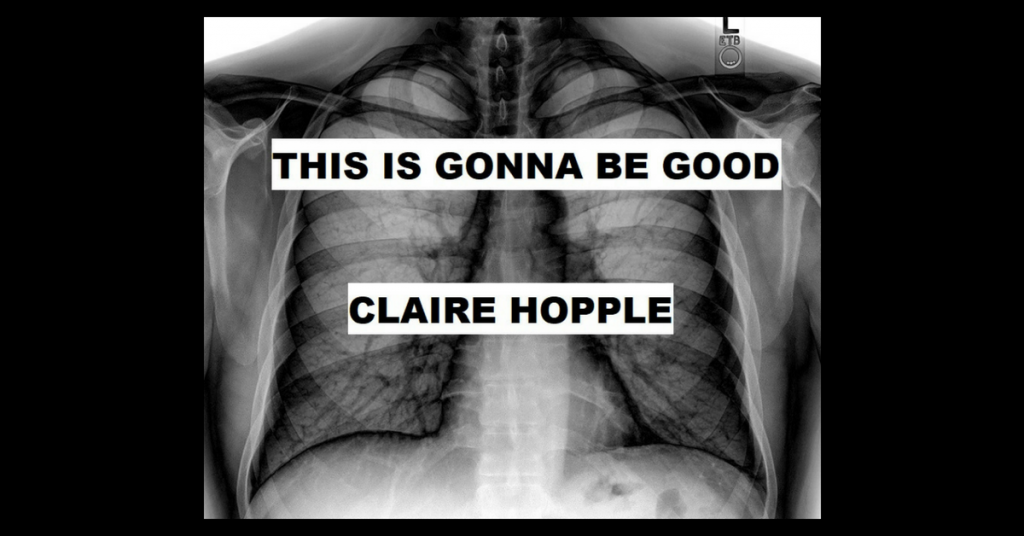


THIS IS GONNA BE GOOD by Claire Hopple
“Do you know where Bernie is?” a stranger asked the man as he was headed in to change.
“Not sure. I think I saw him in the parking lot a minute ago,” said the man, trying to be helpful to the stranger even though he was technically a stranger.
“Who’s Bernie?” the stranger then asked.
“I thought you were looking for Bernie. How can you be looking for him if you don’t know who he is?”
“Why can’t I be looking for someone I don’t know?”
The man had had enough. He went inside to change for his shift so he wouldn’t be late. Coming back out to the main room in full garb, he saw Bernie picking a bandaid off the plaque in the corner. It read: PLEASE DO NOT TOUCH, was engraved and everything, but was screwed into the wall high enough so that it was unclear what one wasn’t supposed to touch. The bandaid was covering the word “NOT” rather defiantly.
“I think that was someone from the Association,” said Bernie.
The bandaid was flapping at the edge of his middle finger, successfully dislodged from the plaque. Bernie peeked at the gauze portion to see if it was used before tossing it into the trash.
“The Association?”
“Yes, The Association for Living History Farm and Agricultural Museums. Those guys.”
The man didn’t know such an association existed, had just started this job a few months ago, but didn’t want to rankle Bernie even more by asking followup questions.
“This place is not in shape for visits from the Association. This could be bad. I don’t want to end up like the settlement. You know what happened to Todd at Jamestown.”
The man tried not to remember what happened to Todd at Jamestown. It was Bernie’s standard cautionary tale for when anything went wrong.
He knew what this was really about. Tourists would rather drive eight miles out of the way to visit the wildlife refuge than come here. There, exotic animals appeared unencumbered by civilization. Their labyrinthine pathways seemed especially natural and created a pleasant plume of dirt when you scuffed your feet along them.
The man visited once but didn’t want to go back. The animals looked mutinous and the humans hypnotic. He had found a cage marked “Horned Viper” that appeared empty and struggled not to apply any meaning to it. Push pop carapaces littered the paths. Maybe we should be handing out push pops, the man thought.
*
Power lines buzzed above him on his way to the coffee shop. The buzzing forced him to imagine what impulses were being carried across right then, directly over his head. He entered, ordered, found a nice table near the wall of windows at the front. Outside, a woman was telling a rather animated story to her friend on the bench up against the window. She was gesturing high enough to look like she was reaching to give the man a high five.
He unceremoniously gulped his to-go cup and waited. The sleeve on the cup kept slipping and he thought about the frustrating nature of gravity, but also wondered why the barista had given him a portable cup rather than a mug. Did she expect him to leave?
He was not leaving. He was meeting a manager or director of some sort from an in-home aide service.
The man’s father was not doing well. In fact, the man was pretty sure his father was gradually becoming a recluse. His father had mentioned something about conch shells, how he could hear the sound of muffled waves just as clearly from pressing a mug to his ear as he could from a shell found near the wave’s end. At the time, he figured his father was just lonely or perhaps becoming a poet. He thought about getting him a no-nonsense pet, something that didn’t require a lot of maintenance, like a turtle. But the pets that require the least amount of maintenance also seem to provide the least amount of comfort.
Plus, the turtle was sure to outlive his father. And what was the man ultimately going to do with a turtle once his father passed, especially one that he indirectly inherited from himself?
The man wasn’t sure about the in-home care thing since his father was in very good physical condition. He didn’t know if reclusive tendencies was a box you could check on a form. But mental health is just as important, he thought.
And people talk about nervous breakdowns but maybe it doesn’t have to be like that. If you lean into it, accept the madness creeping over you, maybe it can be a peaceful adjustment. Like slipping into warm bath water. Like the gradual murk clouding the waters in a turtle tank.
She was late.
Being a historical interpreter mostly meant advising visitors to hold on to the railing along the stairs. Telling kids as well as adults, “Everyone has to hold on. No one is above hanging on.”
It also meant trying to fuse history with the present to a horde of students on field trips and retirees finally able to travel. And they came to this vaguely colonial site to hear about farming practices and blacksmithing techniques while the jake brakes of semis shuddered on the overpass. A submissive, sonorous percussion giving into the slope.
The man had applied, desperate for a way out of a misleading corporate position. He had been told travel would take up around 25% of his time but it was actually closer to 40%. The man’s ears kept popping and clogging from elevation changes to the point where he could no longer hear what went on in the meetings, the ones the company thought were worth flying the man hundreds of miles to attend, 40% of the time.
He suspected he landed this job with absolutely no interpreting experience merely because he was a man. With no battle scenes to reenact and no weapons to wield, the staff was mostly made up of women. Guys thought the big show was in Williamsburg. But these women wielded plowshares and ironwork and could maintain the fields far better than he could.
Some of the reenactors used to be street performers and some thought they deserved to slough off the first few letters entirely, transforming purely into actors.
The only other male on staff was Ames, an aspiring magician, who practiced tricks when things were slow. The man wasn’t impressed with his tricks. They were sloppy and unrehearsed. And also because what doesn’t disappear? What doesn’t eventually dissolve on its own?
Ames fumbled through stunts. He muttered things like, “I’ll get the hang of it. It’s just muscle memory. Like learning guitar.” But he wasn’t improving. Ames would say things like “This is gonna be good,” and “Wait, we’re getting to the good part,” which totally diffused any possibility for goodness in the impending act.
Muscle memory isn’t always ideal, the man kept to himself. Isn’t it just practicing an action over and over until it’s automatic? So that if every action were purely muscle memory, your whole life would be forgotten before it’s even gotten? The man thought about all of this while he nodded to Ames, polished the spinning wheel display.
*
The man had come to expect two things from his father. First, he wasn’t going to let an aide swing by his home a few days a week. This was less of a suspicion and more of a reality, since his father had already kicked out the aide within the first hour. Second, his father wasn't going to go out into the world anymore, but he could let some of the more entertaining parts of the world in.
So he drove Ames out to the house, switching out his straw farmer hat for a tall black one. They parked next to his father’s overly reinforced mailbox. His father understood the importance of mail but also understood the power of baseball bats and midnight teenage angst.
He made Ames tuck his long hair into a skinny ponytail. Ames had that mangled look caused by hair that’d been dyed for decades, like split and dried firewood stacked indoors. Just like the man’s mother used to have.
A song played on the radio in the car but it didn’t sound right. After listening for a few seconds, the man realized what was off about it. This song had become such a popular choice for karaoke that the original now sounded like a remake. No squeals or squawks or jumbled lyrics. It stuck out precisely because it was performed so cleanly.
The man gave Ames an encouraging pat on the shoulder before shutting off the engine and opening the door.
